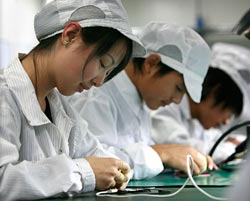 Apple faces mounting pressure from consumer groups over harsh conditions that workers are exposed to in China-based factories that produce iPhones and
iPads. Advocacy organizations have launched online campaigns aimed at persuading the tech giant to provide better protection for workers and closer monitoring and reporting on labor violations by
Chinese suppliers.
Apple faces mounting pressure from consumer groups over harsh conditions that workers are exposed to in China-based factories that produce iPhones and
iPads. Advocacy organizations have launched online campaigns aimed at persuading the tech giant to provide better protection for workers and closer monitoring and reporting on labor violations by
Chinese suppliers.
Criticism of Apple's business practices has ramped up in the wake of recent reports in The New York Times and on NPR revealed human rights abuses at its
suppliers’ factories in China, ranging from working excessive overtime to living together in crowded dormitories to suffering carpal tunnel syndrome from repetitive motions over long work
days.
About 140 workers at one Apple supplier in China were injured two years ago using a poisonous chemical to clean iPhone screens. Two explosions in 2010 killed four people while injuring
more than 77.
advertisement
advertisement
Change.org announced an online campaign started by a self-described Apple “super-user” to prod Apple to upgrade conditions at its China factories. In the last two
days, the advocacy group said more than 140,000 had signed a petition asking that Apple release a worker protection strategy for new product releases and publish the results of FLA's monitoring of Apple supplier factories. That figure
had climbed by 150,000 by noon today.
“Apple is supposed to 'think different,' which is one of the reasons I love and use the products they make,” said petition organizer Mike
Shields, in a statement. “But the horrible human suffering that goes into making Apple products isn't what they promise in their brand. I was heartsick when I learned what was really
happening.”
Consumer group SumOfUs announced a separate online effort Tuesday pressing Apple to address dangerous workplace conditions, which it said had garnered 35,000 signatures
in the first 24 hours. Taren Stinebrickner-Kauffman, the organization’ executive director, stated that Apple's hip, well-educated customers don’t want to be complicit in “sweatshop
labor.”
Apple issued a report last month detailing working conditions throughout its supply chain, centered in China, acknowledging that more than 100 facilities were improperly
storing, moving or handling hazardous chemicals. Nearly a third of its suppliers did not adhere to Apple's standards for wages and benefits.
Apple CEO Tim Cook told The Wall Street
Journal at the time that safety was of the “utmost importance” to the company, which said it would join the Fair Labor Association, allowing outside monitoring of its suppliers.
Apple now finds itself caught between meeting surging demand for its products and responding effectively to the outcry over labor conditions at its China-based facilities. In the last quarter of
2011, the company sold a record 37 million iPhones, 15 million iPads and 15.4 million iPods. It posted a quarterly profit of $13 billion on revenue of $46.3 billion.
Feverish demand for the
iPhone 4S in led Apple to temporarily halt sales at five retail stores in mainland China last month after a fracas broke out at an Apple Store in Beijing. In the company’s most recent quarterly
conference call last week, Cook said demand in China was “off the charts.” But there was no discussion about the backlash the company now faces in relation to its China factories.